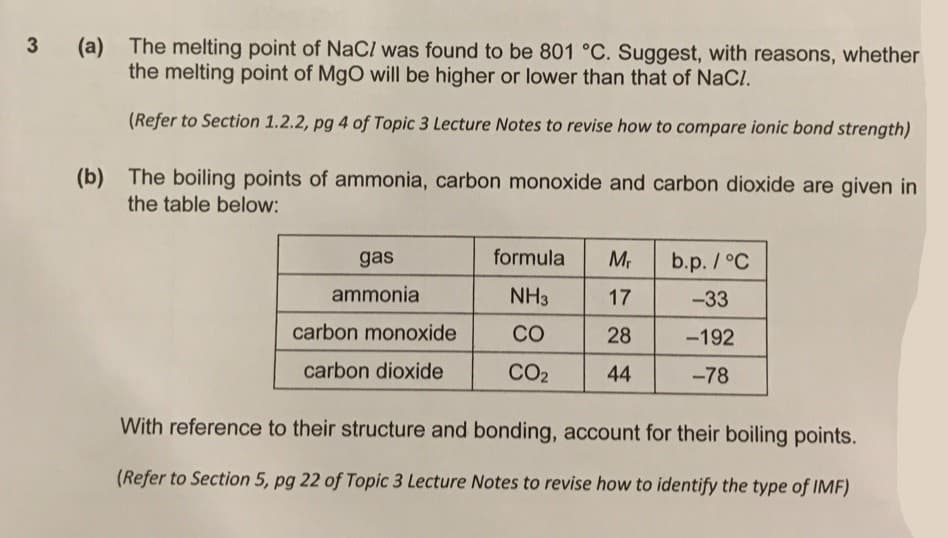(a) The melting point of NaCI was found to be 801 °C. Suggest, with reasons, whether the melting point of MgO will be higher or lower than that of NaCl. (Refer to Section 1.2.2, pg 4 of Topic 3 Lecture Notes to revise how to compare ionic bond strength) (b) The boiling points of ammonia, carbon monoxide and carbon dioxide are given in the table below: gas formula M, b.p./°C ammonia NH3 17 -33 carbon monoxide CO 28 192 - carbon dioxide CO2 44 -78 With reference to their structure and bonding, account for their boiling points. (Refer to Section 5, pg 22 of Topic 3 Lecture Notes to revise how to identify the type of IMF)
(a) The melting point of NaCI was found to be 801 °C. Suggest, with reasons, whether the melting point of MgO will be higher or lower than that of NaCl. (Refer to Section 1.2.2, pg 4 of Topic 3 Lecture Notes to revise how to compare ionic bond strength) (b) The boiling points of ammonia, carbon monoxide and carbon dioxide are given in the table below: gas formula M, b.p./°C ammonia NH3 17 -33 carbon monoxide CO 28 192 - carbon dioxide CO2 44 -78 With reference to their structure and bonding, account for their boiling points. (Refer to Section 5, pg 22 of Topic 3 Lecture Notes to revise how to identify the type of IMF)
Chapter13: Titrations In Analytical Chemistry
Section: Chapter Questions
Problem 13.13QAP
Related questions
Question

Transcribed Image Text:(a) The melting point of NaC/ was found to be 801 °C. Suggest, with reasons, whether
the melting point of MgO will be higher or lower than that of NaCl.
3
(Refer to Section 1.2.2, pg 4 of Topic 3 Lecture Notes to revise how to compare ionic bond strength)
(b) The boiling points of ammonia, carbon monoxide and carbon dioxide are given in
the table below:
gas
formula
b.p. /°C
ammonia
NH3
17
-33
carbon monoxide
CO
28
-192
carbon dioxide
CO2
44
-78
With reference to their structure and bonding, account for their boiling points.
(Refer to Section 5, pg 22 of Topic 3 Lecture Notes to revise how to identify the type of IMF)
Expert Solution
This question has been solved!
Explore an expertly crafted, step-by-step solution for a thorough understanding of key concepts.
Step by step
Solved in 3 steps with 1 images

Knowledge Booster
Learn more about
Need a deep-dive on the concept behind this application? Look no further. Learn more about this topic, chemistry and related others by exploring similar questions and additional content below.Recommended textbooks for you


Principles of Modern Chemistry
Chemistry
ISBN:
9781305079113
Author:
David W. Oxtoby, H. Pat Gillis, Laurie J. Butler
Publisher:
Cengage Learning


Principles of Modern Chemistry
Chemistry
ISBN:
9781305079113
Author:
David W. Oxtoby, H. Pat Gillis, Laurie J. Butler
Publisher:
Cengage Learning